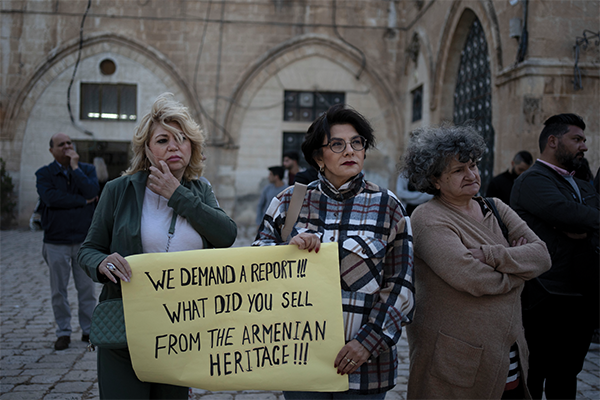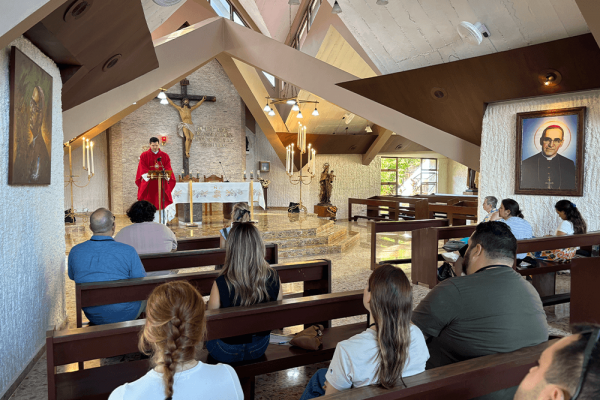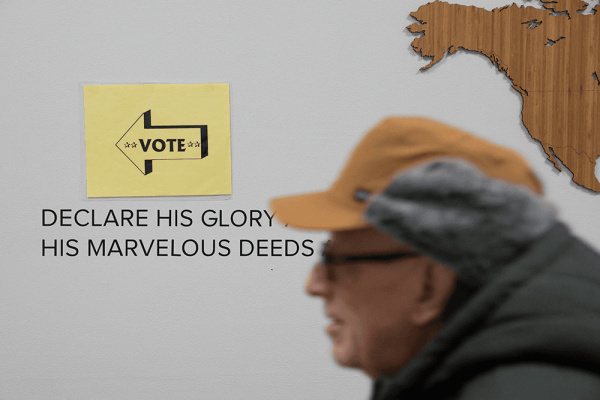In 1981, three years after Iran’s Islamic Revolution, women were banned from entering soccer stadiums in the country.
On Oct. 10, 2019, after 40 years of protest, women in Iran were finally allowed to buy tickets and attend a soccer match. Iran was playing against Cambodia in Azadi Stadium.
Immediately after the Iranian Revolution in 1979, women in Iran were prohibited from attending certain sporting events and were only permitted segregated access to other public spaces. Conservatives have often argued that allowing women to watch men dressed in shorts playing football is a threat to Islamic values.
“I cannot remember the last time I saw so many happy faces of Iranian women,” said Sarah (pseudonym), an activist who runs a forum called Open Stadiums that advocates for women's access to Iran's stadiums. In an interview with Sojourners, she recollected what she saw inside the stadium on Oct. 10: “From the security area of the stadium to the stands, there is a tunnel and once you come out of the tunnel, you see the green field of Azadi Stadium for the first time.” Many attendees screamed with joy when they saw the field.
According to Sarah, rumors about Iranian women being able to attend the match against Cambodia had been floating around since July of this year, sparked by discussions between FIFA and the Iranian administration.
“FIFA has clear statutes that say that participating teams are not allowed to practice discrimination when games are happening,” said Jasmin Ramsey, Director of Communications at the Center for Human Rights in Iran (CHRI). Ramsey explained that FIFA’s president Gianni Infantino visited Iran twice during this time and had discussions with Iran’s President Hassan Rouhani.
Ten days before the match against Cambodia, Iranian authorities announced that tickets would be sold to women. At around midnight on Oct. 3, tickets for one section of Azadi Stadium — 700 seats designated for women — became available for online purchase. “I managed to buy a ticket during this time, and it was very exciting because it was the first time that we could buy tickets to watch a match,” Sarah said.
Maryam Shojaei, an Iranian activist who founded a campaign called My Fundamental Right that became the movement No Ban For Women said that on two earlier occasions over the past 15 years, the government allowed women to watch soccer matches. However, many advocates do not consider these occasions as victories over the ban because the tickets were not sold to women in the general public. “Attendance to these matches was by invitation only because only a few women who were close to the Iranian Federation or were relatives of players were invited to attend,” she added.
By the third round of ticket sales, about 3,000 Iranian women had purchased tickets. For the first time in 40 years, women in Iran freely attended a soccer match.
According to Sarah, on Monday Oct. 7, hardline conservatives organized demonstrations in front of the parliament building, giving rise to fears that the decision to relax the ban would be reversed. “But thankfully, this did not happen.”
Many advocates against the ban see the Cambodia match as a partial victory. Of the 80,000 tickets available, only a small fraction were sold to women even though many of the seats remained vacant during game day, Sarah explained.
“What we saw on October 10th is not what we have been calling for,” Shojaei said. “It was still an example of discrimination because many women wanted to go and see the match, but they couldn’t.”
Additionally, stadium authorities ensured that men and women entered the stadium separately and sat in different sections. Sarah explained that the stadium has both a west and an east entrance, and stadium authorities asked women to enter from the eastern side even though their seating area was on the western side. “Making men and women sit separately was very inconvenient, and it was strange because these kinds of segregated sections do not exist in cases of cinemas or concerts,” Sarah said. “I think this kind of segregation was done to satisfy the hardliners.”
“Our demand is for complete access for women for all games in all of Iran’s stadiums,” Shojaei said. A petition she circulated to achieve this goal has nearly 300,000 signatures as of today.
During the match against Cambodia, Ramsey heard reports of an instance where women’s security forces assaulted an audience member, an incident that Sarah also witnessed. The audience member was holding up a sign in solidarity with Sahar Khodayari, a 29-year old soccer fan who set herself on fire in front of a courthouse in Iran in September after learning she could face six months in prison for sneaking into a soccer match.
Khodayari died a few days later from severe burns. Her death sparked both national and international outcry invigorating the movement to lift the ban on women entering soccer stadiums. Advocates flooded social media with the hashtag #BlueGirl. Blue is the color of Khodayari’s favorite team, Esteghlal.
“This was a true testament to the dangers discriminatory policies can bring on half the population,” Ramsey said.
Ramsey went on to explain how protests emerged from all quarters of Iranian society in the wake of Khodayari’s death: from former coaches, former soccer stars, female members of parliament, and male teams that observed moments of silence that were videotaped and shared on social media.
A strange dichotomy exists when it comes to women’s participation in sporting events in Iran. Ramsey explained that while women’s participation as audience members for soccer games is restricted, women are freely allowed to compete in soccer games, take part in weightlifting matches, martial arts, tennis, etc. However, there are rules that require women to wear full-body covering hijabs in Olympic events and there are restrictions on having male coaches.
“This shows the problems that the Islamic Republic has imposed on the people,” Ramsey said. “On one hand, it wants to say that Muslim women can advance and succeed in sports and on the other hand, it wants to keep women away from sporting events that have men competing.”
These protests over stadium access are part of a larger movement of Iranian women who want to achieve the same rights as men in their country.
According to a report by CHRI, women in Iran face numerous restrictions. They cannot become supreme leader, president, members of the Guardian Council, or judges. They are not allowed to travel outside Iran without the permission of their husbands; they do not have equal rights to file for divorce; they have half the inheritance rights that men have; and they can be fired from their jobs on the request of their husbands, to name a few.
“If you go by Iranian law, women are considered half as important as men,” Ramsey said. “So, the fight to enter stadiums is also a fight to gain equal rights in all aspects of public and private life. Like in many other fields, Iranian women have advanced a lot in sports. It would be amazing to see what they could do if they weren’t restricted at all.”
Got something to say about what you're reading? We value your feedback!







